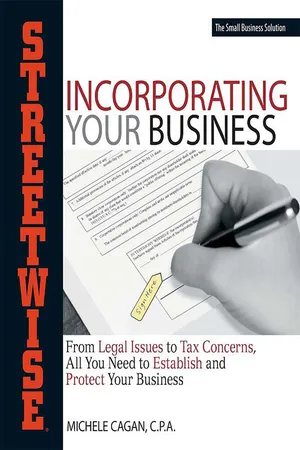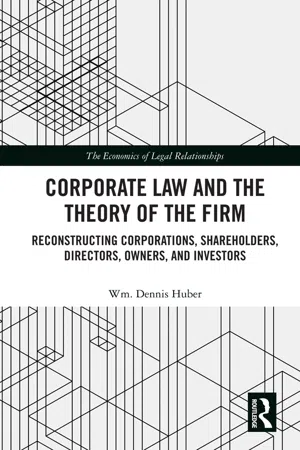Law
Corporations
Corporations are legal entities that are separate from their owners, providing limited liability and allowing for perpetual existence. They can enter into contracts, own property, and sue or be sued. Corporations are formed by filing articles of incorporation with the state and are governed by a board of directors, officers, and shareholders.
Written by Perlego with AI-assistance
Related key terms
7 Key excerpts on "Corporations"
- eBook - ePub
Inside the Boardroom
How Boards Really Work and the Coming Revolution in Corporate Governance
- Richard Leblanc, James Gillies(Authors)
- 2010(Publication Date)
- Wiley(Publisher)
In most countries these acts are relatively permissive in the sense that they make it very easy for a corporation to be chartered. 32 Usually, all that is required of people seeking to form a company is that they be of legal age, not bankrupt and of sound mind. In short, individuals are given the right to create an organization that to all intents and purposes is a form of private government—a legal entity, separate from its members, with a permanent existence. A modern corporation has the following characteristics: • the right to acquire other Corporations and engage in activities of its own choice; • a separation of ownership and management and division of authority between management and a board of directors, governors or overseers; • limited liability for those who invest in it. Through the years, literally tens of thousands of laws and regulations have been enacted that impact upon the corporation, but the fundamental concept of the institution over the centuries has not changed. 33 A VAST ARRAY OF SIMILARITIES AND DIFFERENCES Because economies have become so complex and the law is so permissive with respect to the organization of Corporations, it is not astonishing that almost every type of corporation that can be imagined has, at some time or in some place, been created. They can range in size from one-person companies selling one product or providing one service in a small town, to gigantic organizations with sales larger than the gross national product of some countries, selling a multitude of different products throughout the world, e.g., General Motors and Walmart, and there is every type in between - eBook - ePub
Streetwise Incorporating Your Business
From Legal Issues to Tax Concerns, All You Need to Establish and Protect Your Business
- Michele Cagan(Author)
- 2007(Publication Date)
- Adams Media(Publisher)
Understanding CorporationsPART 2Passage contains an image
Chapter 5The People Chapter 6 The Paperwork Chapter 7 Taking Stock Chapter 8 Get to Know Securities Laws Chapter 9 All About Limited LiabilityCorporations Are “People”Legally speaking, a corporation is a person. That corporate person has certain legal rights and responsibilities, just as real live people do. A corporation has the right to enter into contracts, hire an attorney to represent it in court, file lawsuits, and conduct business in its own name. It also has the responsibility to pay taxes (whenever applicable), fulfill any contractual obligations, and comply with laws and regulations. Though a corporation is considered a person under the law, it is not a “natural person,” and laws that specifically refer to natural persons do not apply to Corporations.Every state authorizes business Corporations to engage in absolutely any business activity not specifically prohibited by law. Essentially, that gives Corporations the power to do just about anything, including things like these:Open and maintain bank accountsOwn assetsIncur liabilitiesLend moneyMake charitable donationsEstablish and maintain employee retirement plansEnter into joint ventures with other businessesHire and fire employeesSo, for legal and business purposes, Corporations are people. However, they need actual people to take all of these actions and to be formed in the first place. Even though real people must be involved in order for a corporation to operate, the people don’t have to stand in for the corporation when it comes to legal issues. Those are strictly the problems of the corporation itself, one of great benefits of incorporation.Incorporators Get Things GoingIf you want your business to be set up as a corporation, you have to incorporate it. The person responsible for doing that is called the incorporator. Basically, an incorporator signs the articles of incorporation and then files those articles with the state. - eBook - ePub
- Christopher May(Author)
- 2015(Publication Date)
- Routledge(Publisher)
4 These characteristics have been established and molded by law: through statutory regulation; through judicial precedent (in common law systems); and via emerging models of international “soft law” regulation. The core set of rights that are generally recognized in most developed country jurisdictions, and elsewhere, are:- the right to a name (and thus to have an identity);
- the right to sue and be sued;
- the right to acquire, hold and dispose of property;
- the right to contract; and
- specified rights under various constitutional and legislative provisions.
[and specifically as regards Corporations]- continued existence, notwithstanding a change in membership or share ownership;
- limited liability of members for organizational legal responsibility; and
- central direction of management.5
While there are also some possible responsibilities attached to a corporation’s activity, these are generally somewhat circumscribed by the impact of limited liability, and the frequent difficulty of establishing the location of decisions that might have led to offences that could require sanction under law.6 For instance, in the United Kingdom the difficulty of establishing a single “directing mind” has undermined past attempts to prosecute corporate manslaughter, despite its statutory introduction as a crime.The legal personality of the corporation might also be seen as an aspect of the structural power of business. By some accounts it excessively empowers business and constrains policy options in a way that can be detrimental to democracy; these “persons” can wield influence in a manner seldom possible for natural persons by virtue of the resources they control and direct.7 - eBook - ePub
- Tom Craig, David Campbell(Authors)
- 2012(Publication Date)
- Routledge(Publisher)
Limited Companies
DOI: 10.4324/9780080454603-4Learning Objectives
After studying this chapter, students should be able to describe:- the different types of incorporation;
- the nature of shares and shareholding;
- the differences between public and private limited companies;
- the legal requirements for limited companies;
- the meaning of limited liability;
- the advantages and disadvantages of limited company status;
- the nature of holding companies;
- the roles of a company’s senior officers.
4.1 Introduction
An Organisation as a Legal Entity
In the case of a sole proprietor, we saw in Chapter 3 that the law recognises the human person carrying out business with a view to profit. Similarly, for partnerships, the law recognises the partners as individuals, albeit working together under a legal agreement. The type of organisations we shall consider in this chapter is quite different from those we considered in the previous chapter.4.2 Corporations
English law recognises three ways in which new Corporations can originate either by charter, statute or by registration – and a corporation exists until it is formally dissolved. Corporations have similar rights and privileges as humans and, while companies may be Corporations, it should be noted that there are different types of corporation.Corporation by Charter
The crown can create any corporation it chooses, and this route of incorporation is usually used by public bodies, such as a university. As the royal charter does not state the precise details of the legal powers of this type of corporation, any contracts it makes cannot be declared void on the grounds of ‘ultra vires - eBook - ePub
Women's Small Business Start-Up Kit, The
A Step-by-Step Legal Guide
- Peri Pakroo(Author)
- 2018(Publication Date)
- NOLO(Publisher)
Your Limited Liability Company: An Operating Manual . Covers how to prepare minutes of meetings, record important business, tax, and legal decisions, and more.• Nolo’s Quick LLC: All You Need to Know About Limited Liability Companies . Offers an overview of LLCs, as well as comparison to other business structures, but does not include any start-up forms.• Nolo’s Guide to Single-Member LLCs , by David M. Steingold. Provides an overview of how to form a single-member LLC, including unique tax and liability issues.• If you want to create your LLC directly on the Internet, use Nolo’s online LLC formation service.Finally, the LLCs section of www.nolo.com includes detailed state-by-state advice on forming an LLC (along with dozens of articles related to business formation).Corporations
For many, the term “corporation” conjures up the image of a massive industrial empire more akin to a nation-state than a small business. In fact, a corporation doesn’t have to be huge, and most aren’t. Stripped to its essentials, a corporation is simply a specific legal structure that imposes certain legal and tax rules on its owners (also called shareholders). A corporation can be as large as IBM or, in many cases, as small as one person.One fundamental legal characteristic of a corporation is that it’s a separate legal entity from its owners. If you’ve already read this chapter’s sections on sole proprietorships and partnerships, you’ll recognize that this is a major difference between those unincorporated business types and Corporations. Another important corporate feature is that shareholders are normally protected from personal liability for business debts. Finally, the corporation itself—not just the shareholders—is subject to income tax.SEE AN EXPERTRunning a publicly traded corporation is complex. - eBook - ePub
Corporate Law and the Theory of the Firm
Reconstructing Corporations, Shareholders, Directors, Owners, and Investors
- Wm. Dennis Huber(Author)
- 2020(Publication Date)
- Routledge(Publisher)
Property laws, agency laws, trust laws, and partnership laws are founded on common law and contract law, meaning that originally they were not statutory but court-made principles. Trust law and partnership law in particular have been have been codified to varying degrees.On the other hand, corporate law is basically statutory, in the sense that, originally, Corporations were created with charters made by some sort of “royal decree” but, in modern times, were created by legislation as opposed to court-made principles. However, although statutory in nature, corporate law is an amalgamation of contract law, property law, agency law, and trust law and is therefore founded on and interpreted by common law principles, particularly when the statutory law is ambiguous or does not otherwise define the rights and duties of the parties.Chapter 1 reviewed basic property and property law. Ownership of Corporations, shares, and corporate assets can only be determined by property law applied to corporate law. Failure to understand or properly apply principles of property law to questions of the ownership of Corporations, shares, and corporate assets has resulted in contradictory court rulings between property law and corporate law within the same jurisdiction.Courts have ruled that shareholders own Corporations as a property right when property law does not permit the ownership of Corporations by shareholders. Bolstered by faulty analysis by economists, courts have ruled that shareholders are “residual owners” and have “residual claims” (although what they are residual claimants of is not entirely clear), which is a property right. But property and statutory corporate law do not permit shareholders to be residual owners or claimants since shareholders have no claims against the corporation or its earnings.The requirements to create an agency relationship were discussed in Chapter 2 - eBook - ePub
- Michael Boylan(Author)
- 2013(Publication Date)
- Wiley-Blackwell(Publisher)
Journal of Financial Economics (1976), 3:305–60. On page 311 they write, “The private corporation or firm is simply one form of legal fiction which serves as a nexus for contracting relationships.”4 Daniel Dennett, “Conditions of Personhood,” in A. O. Rorty, ed., The Identities of Persons (Berkeley: University of California Press, 1976); pp. 175–96.5 John Rawls, “Justice as Reciprocity,” in Samuel Gorovitz, ed., John Stuart Mill, Utilitarianism (Indianapolis: Bobbs-Merrill, 1971); pp. 244–45.6 John Rawls, A Theory of Justice (Cambridge: Harvard University Press, 1970); p. 146.7 Frederick Hallis, Corporate Personality (Oxford: Oxford University Press, 1930); p. xlii.8 Coke’s Reports 253, see Hallis, Corporate Personality , p. xlii.9 See in particular Otto von Gierke, Die Genossenschaftstheorie (Berlin, 1887).10 See Gerald Massey, “Tom, Dick, and Harry and All the King’s Men,” American Philosophical Quarterly (April 1976), 13(2):89–108.11 I am especially indebted to Donald Davidson, “Agency,” in Robert Binkley, Richard Bronaugh, and Ausonio Marras, eds., Agent, Action, and Reason (Toronto: University of Toronto Press, 1971).12 John Kenneth Galbraith, The Age of Uncertainty (Boston: Houghton Mifflin, 1977); p. 261.13 H. L. A. Hart, The Concept of Law (Oxford, Oxford University Press, 1961); ch. 6.14 G. C. Buzby, “Policies—A Guide to What A Company Stands For,” Management Record (March 1962), 24:5–12.15 Peter Drucker, The Concept of Corporation (New York: Crowell, 1972); pp. 36–37.Personalizing Corporate OntologyThe French Way
THOMAS DONALDSONThe trickiest philosophical problems are those for which we choose alternative and self-contradictory solutions. The problem of corporate agency appears to be of this kind, at least insofar as leading theorists investigating it have divided their opinions dramatically, one side declaring the corporation to be an impersonal machine incapable of even modest moral attributes, and the other proclaiming it to be a person with similarities to human beings, similarities sufficient, indeed, to warrant sponsoring the development of moral faculties such as “consciousness” in the corporation analogous to those on the level of flesh and blood people.1
Learn about this page
Index pages curate the most relevant extracts from our library of academic textbooks. They’ve been created using an in-house natural language model (NLM), each adding context and meaning to key research topics.






